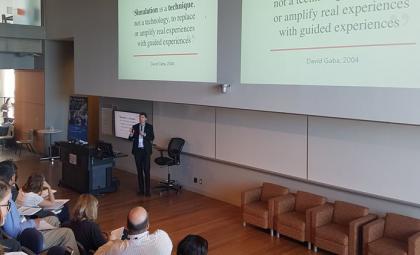Safety and simulation go hand in hand

3RD ANNUAL NATIONAL FORUM ON SIMULATION FOR QUALITY & SAFETY MAKES ITS MARK
Thursday, June 21, 2018 – Philip De Souza
It all started with aviation – simulating flights and running through scenarios to better prepare teams for the situations they might face on the ground and in the air. Today, the concept of simulation has a far wider reach and, thankfully, extends to many areas in healthcare. What do we do if…? What happens when…? How can we better prepare for...?
But it’s not just about the process – it’s also about the people. “Simulation will help take down walls in healthcare,” said Dr. Andrew Petrosoniak, Emergency Physician and Trauma Team Leader at St. Michael’s Hospital. “It can bring together professionals from across the healthcare spectrum to collaborate, but more importantly, to learn from one another.”
Dr. Petrosoniak delivered the opening keynote at the 3rd annual National Forum on Simulation for Quality & Safety, hosted by SIM-one | Canadian Network for Simulation in Healthcare. He energized delegates around taking action at their own organizations by explaining the benefits of simulation to their teams and leadership.
For HIROC, working with SIM-one on events like their National Forum is all about alignment with our vision of partnering to create the safest healthcare system.
During his talk Dr. Petrosoniak shared with delegates his personal journey with simulation and highlighted a few key benefits of implementation. “When it’s used well, simulation improves people’s confidence, improves satisfaction, improves skill performance, and is also something that’s preferred over long, boring lectures,” he said, getting all the delegates nodding in agreement with his last point.
Dr. Petrosoniak delved into connecting the dots when it comes to quality improvement plans. “One of the many nice things about simulation is that we can use it as a dial and adjust to select different types of situations, intensity, and frequencies,” he said.
He also stressed the importance of clear communication throughout the process, “It’s amazing to see and hear what happens when you ask people who may not normally be asked about a process or system. Listening is key.”
And that’s something Arlene Kraft, HIROC’s Manager of Healthcare Risk Management echoed when offering her thoughts on simulation a day earlier at an exclusive event hosted by SIM-one. “Practicing in a simulation environment provides one the opportunity to test skills, knowledge, and communication,” said Kraft. “By discussing and implementing opportunities for improvement while still in the testing stages, we can catch those ‘near misses’ before they actually occur,” she added.
Kraft and a number of healthcare leaders had the opportunity to participate in flying a plane (in a flight simulator of course). When asked about what she learned, Kraft was quick to share, “A culture of trust, teamwork and collaboration – it’s of the utmost importance to ensure safety for everyone.”
Dr. Petrosoniak shared that healthcare design is something he’s passionate about nowadays, and quipped about how he could probably talk so much about it that it would be a whole other keynote. “There’s incredible opportunities for simulation in design thinking,” he added before closing his talk with a quote by Winston Churchill, “Perfection is the enemy of progress.”
COMING SOON ON HEALTHCARE CHANGE MAKERS
HIROC will be sitting down with Dr. Petrosoniak in an upcoming episode of Healthcare Change Makers. Our podcast can be streamed on HIROC.com or downloaded on your app of choice. We hope you’ll tune in!
Philip De Souza is Manager, Communications and Marketing, HIROC
